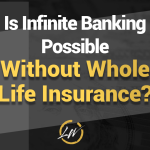In this episode, we will discuss the importance of working with a mutual life insurance company, and how to start thinking like an owner instead of a depositor.
A mutual life company is one of the fundamental pieces of private family financing. You see, whenever you buy a policy from a mutual life insurance company, you become an owner of the company; You’re not a customer of the company anymore you’re the owner. We discuss this and explain all the moving parts. Listen now to learn more.
Topics on Using a Mutual Life Insurance Company To Turn Debt into Wealth:
- The basics of what a mutual life insurance company is and how to think about it
- How a mutual life company, fits into infinite banking and why it’s the best fit
- Being a depositor versus being an owner
- Banks versus insurance companies and how they’re the same and different
- One of the most common questions we’re asked what why it is such a good one to ask
- What a mutual life company, is and isn’t; what they do and what they don’t do
- When changing perspectives yields big dividends
Episode Takeaways:
- Whenever you buy a policy from a mutual life insurance company, you become an owner of the company; You’re not a customer of the company anymore you’re the owner.
- A mutual life insurance company, simply refers to the relationship a policy holder has with the owners of the company. So, in a mutual company, the only way to obtain ownership is through buying, participating whole life insurance policies..
- Essentially, a mutual organization of people coming together with a common purpose, you know, taking care of each other.
- A mutual life insurance company is not making money off of you. They may make money, but they’re here to make you money.
Episode Resources:
- What is Infinite Banking?
- Infinite Banking Glossary of Terms
- Private Family Bank
- Living Wealth Blog
- What is Whole Life Insurance?
Podcast transcript for episode 64: Working With Life Insurance Company
Nate: In this episode, we will discuss the importance of working with a mutual life insurance company, when you follow the infinite banking concept and how important it is that you start thinking like an owner instead of a depositor. She’s Holly and she helps people find financial freedom.
Holly: He’s Nate, he makes sense out of money. This is Dollars and Nonsense. If you follow the herd, you will be slaughtered.
Nate: All right, so today we are talking about infinite banking, believe it or not. I know for those of you listeners, we talk about it a decent amount, and we get some questions on various aspects of it from listeners and you probably heard us before mention how there’s a specific type of life insurance company that really fits with this whole becoming your own banker concept and that is a company that is called a mutual company, but what is a mutual life insurance? What is that word mutual referring to?
Holly: Mutual basically means you’re a shareholder, you’re an owner almost of the company, right? When you buy this life insurance policy, you become a shareholder of that company. You have a say in the company. You have your rights, just like somebody that would invest in a bank, maybe in the stock, let’s say I’m a bank, they become a shareholder of the bank so they make money based off how a bank performs.
The same is true of a mutual insurance company. Once you become that shareholder, owner is the way, I even like to think, because you do have a say in the company, it means that basically any money that company makes, anything they produce basically goes to you in the form of dividends, really.
Nate: Right? So a mutual life insurance company, simply refers to the relationship a policy holder has with the owners of the company. So in a mutual company, the only way to obtain ownership is through buying, participating whole life insurance policies. There’s no other way. You know, there are some things called stock life insurance companies.
Holly: You don’t want those.
Nate: Yeah, you don’t really want those. Especially for IBC, for what we’re trying to accomplish. They’re here to make money off you for their owners. So, the relationship is different. You are a customer of that company buying a product from them. But you do not have any say in the ownership, in the way the company’s run, nor do you get to receive any of the profits at the end of the year. They’re not here to make money for you. They’re here to make money off of you.
And that kind of brings us into the question I get all the time. And that Holly gets all the time. You’re talking about infinite banking and it’s starting to sound a bit too good to be true. And one of the first question that kind of comes up when it’s starting to sound too good to be true is, well, what’s in it for the insurance company? How do they make money? What’s their angle?
I’m fine with the question. Please continue asking asking the questions. But it’s kind of an interesting change in perspective because whenever you buy a policy from mutual life insurance company, be, you become an owner of the company, you’re not a customer of the company anymore. Like, the stock company you could say, yeah, well what’s in it for them? And we’d say, oh, well they’re, they do this and this and this with the money and you know, they gave you this benefit and in exchange, they’re working with the money and they’re gonna make a profit and they pass that to their owner. So it’s obviously their owners some money in and you guys will get your benefit.
It’s like we could go through that discussion, but it gets a little convoluted whenever you asked that same style of question when new with a mutual life insurance company, because they’re only in business to make money for you.
In other words, if they have a profit at the end of the year, let’s say the insurance company makes $100 million in profit. They’re sitting on this $100 million dollars and are like, man, what are we going to do with this? It’s not like they’re going to send it somewhere else. They’re not looking out for themselves per se. They’re only in business to profit the policy holders who own the company. Essentially, a mutual organization of people coming together with a common purpose, you know, taking care of each other. That’s the original purpose of the mutual life insurance company. This big pool of money makes profit and then it gets distributed back to the policy holders. When you’re asking about the angle, the angle is they’re trying to make a profit, but the question is for who. Who is making all the money?
Holly: For you.
Nate: It’s for you. It’s that transition that people have to take Holly from. We’re so used to people making money off of us, but like the banks you work with right now, everyone listening, the banks make money off of you. You’re a customer. A lot of financial advisors make money off of you. They’re in business for themselves.
A mutual life insurance company is not making money off of you. They may make money, but they’re here to make you money. They’re here to profit the mutual owners of the company. The company is only in existence to profit the mutual organization, which profits you and me, as policyholders, just in the same way that the conventional bank is in business to profit its owners. It’s not enough to get you, I guess what I’m trying to get at.
Holly: Yeah, and I think that’s a big misconception is they make money the same way a bank makes money. The differences, the bank is making money for its owners of bank. The life insurance company is making money for you. If you own a mutual life insurance policy, dividend paying, then they’re making money for you.
And their reason why they’re doing this is so that they can be successful and benefit one another. And I think we get so caught up with feeling like we’ve been taken advantage so many times that we don’t stop to think, oh, it’s not what’s in it for them. It’s what they’re doing for you. They’re using your money or allowing you even to use your money in order to generate more money.
Nate: So essentially we have to change the perspective. I like what you said, Holly, too how this whole fits into this banking concept, part of the principle, the main foundation, is that in reality banks and insurance companies are practically the same thing. Life insurance companies and banks. You know, they do the exact same thing. They both take other people’s money, depositors’ money, and make loans with it. Other people paying interest back to the bank and there’s a profit made there and that profit is typically distributed to the ownership of it and that’s what we’re trying to say is that banks and insurance companies do pretty much the same thing. The reason why you can become your own banker with a mutual life insurance company and a policy is because of the system that’s actually happening behind there that they’re doing the same thing a bank does. You can operate your policy just very similarly to a bank account, but at the end of the day you have to ask the question, who’s actually making all the money off my money?
And right now, you should be asking that same question about the bank account that you’re in. For some reason we don’t ask that question all the time by the way, like when we present at IBC, we say, well, what’s in it for the insurance company?
But we don’t ask that to like the bank teller when we go open an account. Well, what’s in it for the bank? Well, obviously the bank is here to make a lot of money off of you and they do a great job doing it. They pay you a half a percent on your deposit and lend it out at 4% to 5% of the next guy and make the spread.
The difference between that and then working as a bank inside the mutual life insurance company is the mutual edge. The insurance company’s gonna do the same. They’re going to take your money and lend at 4% to 5% but there’s just no one keeping the spread. Sure, the insurance company’s going to have expenses that have to get paid to run the operation, but there’s no spread to be sent to other people. It just comes back to us. That’s why the system works, people not. It’s some fancy magic money. It’s just how the system plays out. Why Nelson Nash wrote the book was to simply unveil this, that you can do banking from a policy at a mutual life insurance company and just make a lot more money than if you use somebody else’s bank down the street.
Holly: Yeah, and think of your policy. Your policy is the product. The mutual life insurance policy is the product you’re using to be your own banker. That’s what you’re doing. You’re just switching places with the bank. Instead of using the traditional bank, you’re going to use a mutual life insurance company and your policy is the bank. It’s the product or using, I mean it does amaze me that we don’t go into a bank and ask what’s in it for the bank when we open an account, but it’s one of the very first questions I get asked all the time: what’s in it for the life insurance company?
Nate: I’m not saying it’s hypocritical, I’m just saying we bring that type of mentality in and that’s perfectly fine. I love the question because I love answering the question. Pretty much everything I go into, if I get pitched an investment opportunity of some sort, that’s one of the first questions I ask too is, well, what’s in it for you? You know, if I put money in this and you’re saying all of these things, you know, returns and things I’m going to get, well, how do you make money? I think that’s a very good question to ask when dealing with where your money’s going. But what’s interesting is we can’t stay in that mentality when you’re starting to work in infinite banking because then every single little thing that the insurance company does, you’re just thinking, oh, that’s they’re getting me. Oh, that’s how they’re sticking it to me. Oh, this or that.
And we’re constantly thinking that there’s a little bit of, they’re off to make money off of me. They’re using me. Our guards are up, because we’re so used to being used like that. And so whenever you work with a mutual company, you have to change your mentality from being just a depositor a customer into being an owner and everything the insurance committee does that helps them make money also helps your policy make more money with higher dividends.
Anything that helps make the insurance company money I’m all for, because that just means that more money comes back to us as policy holders. I hope they’re making a huge amount of money off all of us. They’re not going to keep it. They send it back. That’s the whole purpose of the mutual organization is to profit the policy holders. They’re just serving us. That really is, I know it sounds magical, but it’s like … Nelson Nash in his book he says it’s kind of like a trust agreement, a trust arrangement, where you have a grantor who puts the money in. That’s kind of like you as the policy owner. You have the trustee that works with the money and then you have a beneficiary on the backside.
The insurance company is just the trustee of the money, they’re the ones who are putting it to work to make profit, but the trustee doesn’t own the money. It’s not his money. He may be getting paid, the expenses of course of the company are getting paid, but in reality the only reason they’re making money is because of the grantor and the beneficiary want this guy to do well. It’s not like he has any ownership of it. You are the owner of the company, you are the owner of the policy and the insurance company is just the servicer of it, is essentially what it is.
Announcer: Have you ever wondered how to stop worrying and just make and keep more of your money? We believe in challenging the status quo. We believe in defying conventional wealth tools while maintaining traditional values. After all, most of those conventional tools only ever seem to make someone else on the inner circle rich. You can become debt free, in control, secure, and achieve financial significance. Private family financing can be used in your life and even your business. Let us help set you free from worry. Visit LivingWealth.com/Freedom to receive your free copy of The Tree of Wealth. You’ll learn about the tools banks themselves use and rarely speak about openly. These are the strategies used to launch Disney, JC Penney, and countless successful families.
For more than 46 years, Living Wealth has focused on treating clients with respect and honesty while helping them achieve financial freedom. Learn how to turn your hard work into significance. Visit LivingWealth.com/Freedom to instantly receive your free copy of The Tree of Wealth. You’ll be enabled to have cash today and in the future. It’s more than mere infinite banking. It’s private family financing. Don’t let banks and Wall Street dictate your financial future. Go to LivingWealth.com/Freedom to instantly receive your free copy of The Tree of Wealth. Now, back to Nate and Holly.
Holly: Stop thinking like you’re the depositor on your whole life insurance policy and actually view it as you are the owner. There’s a line, it says you’re the owner of this life insurance policy. So as an owner, what should you be doing? If you owned your own company, if you own your own house, you’ve got to start thinking like an owner, right? We can’t just keep thinking, I’m just going and putting that money in there and that’s all I’m going to do. Now, the insurance company, if that’s all you do, they’re going to still make you money. Right, Nate?
Nate: Yeah, certainly.
Holly: Certainly, if all you do is go and deposit that, you’re still gonna make money, okay? But surely as an owner, you wouldn’t, if somebody came in and invested in your company and I’m going to use it as that and give you money, would you just take that money and let it sit and do absolutely nothing with it?
Nate: Hopefully not.
Holly: You’ve got to work with it and that’s what infinite banking is about, is taking your money and working with it and creating more money.
Nate: That’s a good point, Holly, is it kind of goes both ways. Not only is it helpful to see yourself as an owner as far as your relationship goes with the insurance company and kind of getting over that fear of them being out to get you well. The second way, if you think like an owner, which we’ve talked about this on other podcasts, if you just actually think of yourself as an owner of this business of banking, that you’re taking a hold of, you’re right, Holly you’re going to be way more successful regardless of what the policy is doing just by itself. How you use it is going to be a huge deal.
So, that ownership kind of goes both ways, I think with what you were kind of getting to is that, yeah, we can change our perspective on our relationship with the insurance company that they’re not out to get us, but also as ownership we can have some of that responsibility laid on our shoulders that how I use this policy and what I do with it can greatly impact. I sell. It’s not just in depositories and just letting money sit, but it’s how I use it and keeping money in motion can certainly help improve your overall financial wellbeing.
Holly: I absolutely want you to view every premium as a deposit. Okay? I absolutely do want you to do that, but it’s a deposit into your own bank account and you just leave your money sitting there and never use it for anything in your bank. No. You’re using all the money typically in your bank account to pay for everything else. Well, in the same way as an owner of this policy or an owner of a business, view it as a business. It’s a bank. Okay? It’s your bank. You’ve got to do something with it or else it’s just sitting there and somebody else is going to use it and keep it in motion.
I mean, the insurance company is going to, whether you leave it sitting in or not, but you will do so much more if you change your mindset from just of depositor to an owner. You truly change that mindset? You will be so much more successful with the infinite banking concept and how to create wealth for your family for generations to come.
Nate: Absolutely. You know, that’s really what we wanted to share for today. To give you some confidence and some encouragement to understand that the insurance companies are not out to get you, especially the mutual life insurance companies. We need to get over this whole, what’s their angle, what’s in it for them, and just focus on being confident that they’re here to profit you as an owner and to get that ownership mentality in place that anything profits them profits you, but also how you work with it and how you use it as the owner of the policy, as the one in charge of what happens to the cash value. The buck stops at you and how you use it and work with it can greatly affect the performance of your wealth all across the board.
Holly: This has been Dollars and Nonsense. If you follow the herd, you will be slaughtered. For free transcripts and resources, please visit LivingWealth.com/E64.









